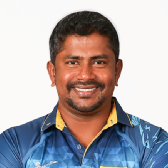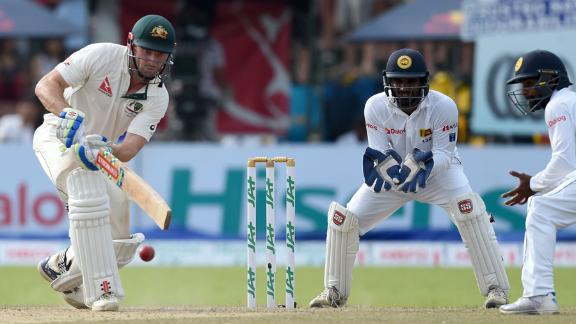Sri Lanka 355 and 22 for 1 (Karunaratne 8*, Silva 6*) trail Australia 379 (S Marsh 130, Smith 119, M Marsh 53, Herath 6-81) by 2 runs
Scorecard and ball-by-ball details
This was a handy day of Test cricket all round. Rangana Herath's magic hands conjured six wickets. Mitchell Marsh's hard hands cost him the chance for more than a fifty. Kusal Perera's lightning hands effected two brilliant stumpings. Shaun Marsh and Steven Smith played invaluable hands, scoring Australia's only two centuries of the series. And by the close of play on the third day in Colombo, it was impossible to say which team had the upper hand.
That, after a couple of walkovers in Pallekele and Galle, was a blessing. True, the Warne-Muralitharan Trophy will be presented to Angelo Mathews no matter what happens in this Test, but Smith and Marsh at least reduced the chances of a whitewash and made a contest of this match. And it is accurate to lay the credit entirely with those two men, for after their 246-run partnership ended, Australia's last nine wickets tumbled for 112.
For the period of their union, it was as if Australia were playing a different series. The 2011 series, perhaps, when Marsh scored a century on debut and Australia lifted the trophy.
The ball still turned, but Marsh and Smith handled it with aplomb, using their feet, finding the gaps, showing patience and respect. It was enough, along with the second fifty of Mitchell Marsh's career, to give Australia a first-innings lead of 24.
By stumps, Sri Lanka had reduced that deficit to two runs, moving to 22 for 1. A change of openers did not improve their top-order record in this series. Dilruwan Perera, bumped up to open alongside Dimuth Karunaratne, was lbw when he offered no shot to a fast inswinger from Mitchell Starc. The score was 8 for 1, which remarkably was Sri Lanka's biggest opening partnership of the series. At close, Karunaratne was on 8 and Kaushal Silva had 6.
But this day was about the Smith-Marsh partnership, which became the fourth-highest stand for any Australian pair for any wicket in a Test in Asia. The most recent such occasion had also featured Marsh: on debut against Sri Lanka in Pallekele in 2011 he had put on 258 with Michael Hussey for the fourth wicket.
Since then, Marsh has been the source of great frustration for Australia, his obvious talent and his ability to score Test centuries offset by frequent troughs in his scoring. That this is his 18th Test and yet his seventh stint in the side shows that the selectors appreciate his potential but have often been vexed by his inconsistency.
But at 33, Marsh might just be pushing his case for a lengthy stay in the side. His hundred in Colombo was his second from consecutive Test innings, though they have come eight months apart - almost a pregnant pause, and indeed he did become a father during the downtime. In December Marsh was dropped after making 182 against West Indies in Hobart, where he had been an injury replacement for Usman Khawaja.
His approach to this innings could hardly have been a finer audition for a place in Australia's line-up for next year's Test tour of India - one country in which Marsh has never played a Test match. For the most part, he picked the turn and played with soft hands, working the ball through gaps, alternating between playing forward and back. His hundred - the fourth of his Test career - came up with a boundary swept fine off Dilruwan Perera off his 214th delivery.
Smith's century, the 15th of his career and his first in Asia, came up soon afterwards from his 176th ball when he advanced and clipped Perera through midwicket. Like Marsh, Smith used his feet and played along the ground, and was strong through both cover and midwicket. Smith has now scored a century against every Test nation that he has played with the sole exception of Pakistan, and a home series against them this summer gives him every chance of rectifying that.
But once the partnership was broken, wickets started to fall more freely. Herath, who struggled in the morning session and left the field still suffering from discomfort after being struck in the groin while batting on the second day, found his mojo in the second session. But the highlight of the session was Kusal Perera's brilliant work with the gloves. Twice within five overs, he stumped Australian batsmen off Herath, his hands so slick they looked fast even on slow-motion replays.
Smith was the first of the two victims, drawn forward by Herath and found by the third umpire to have dragged his foot fractionally outside the crease when the bails were whipped off. The second such dismissal was that of Moises Henriques, included for the fourth Test of his career and his first in more than three years. He never looked comfortable, and fell in similar fashion for 4, the victim of Perera's lightning glovework.
It meant that three wickets had fallen within the first 10 overs of the new ball, Suranga Lakmal having already accounted for Shaun Marsh, who chopped on for 130 from 281 deliveries. That ended the long partnership with Smith, who finished on 119 from 218 balls a few overs later. No other Australian partnership reached fifty.
Adam Voges was lbw to Herath for 22, beaten by a ball that turned exquisitely past the outside edge and would have hit off stump. Peter Nevill (14) was similarly beaten and trapped lbw by Dilruwan Perera, though this time he played for spin that never arrived. Nathan Lyon was caught in close off Perera, Josh Hazlewood bowled by Herath and Jon Holland taken at slip to leave Herath with 6 for 81, and 21 wickets so far in the series.
Only Mitchell Marsh had offered any real resistance after his brother's wicket. Marsh has contributed cameos on a regular basis in his Test career but not since his second Test, played against Pakistan in the UAE back in 2014, had he made a half-century. Here he did so in impressive style, punishing loose balls when given the chance and respecting the good ones.
On 53, though, he prodded with hard hands at Herath and was snapped up sharply by Kusal Mendis at bat-pad. Marsh's face told the story: he couldn't believe what he had done. But at least he had done his bit for Australia, and for making this match a contest. With two days to play, only two runs and one wicket separated the teams. A fascinating final two days were in prospect.




